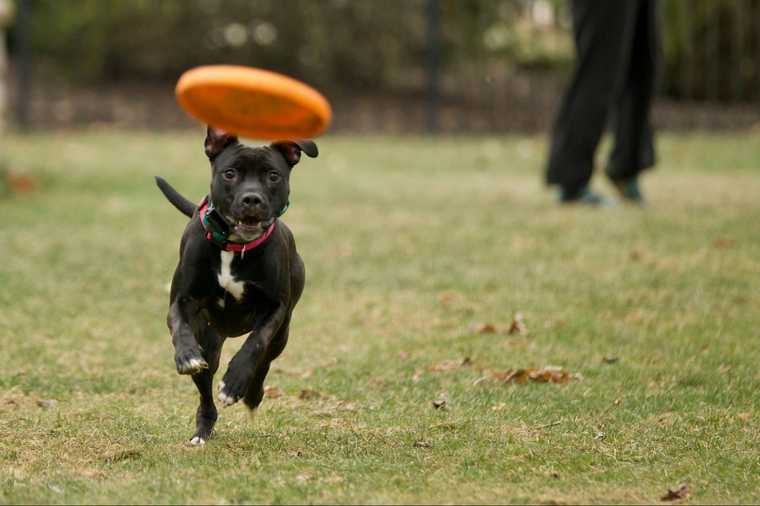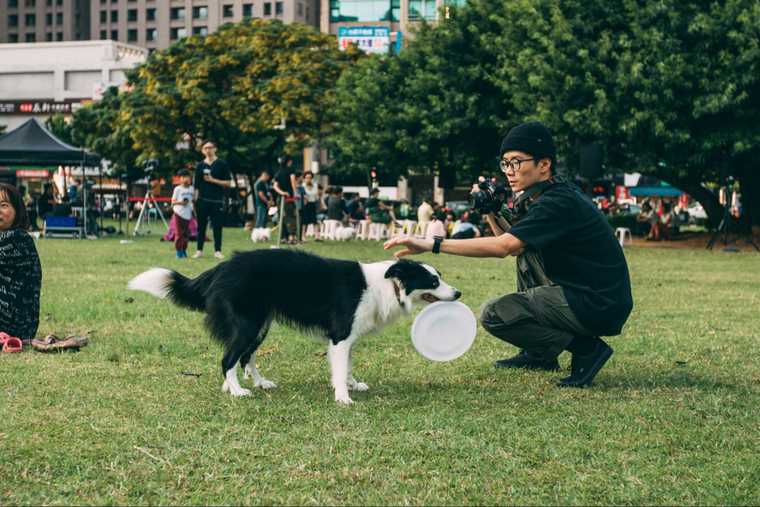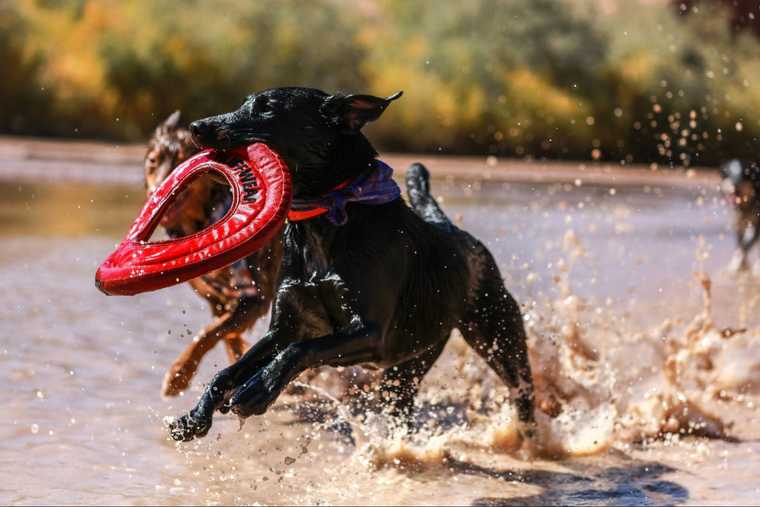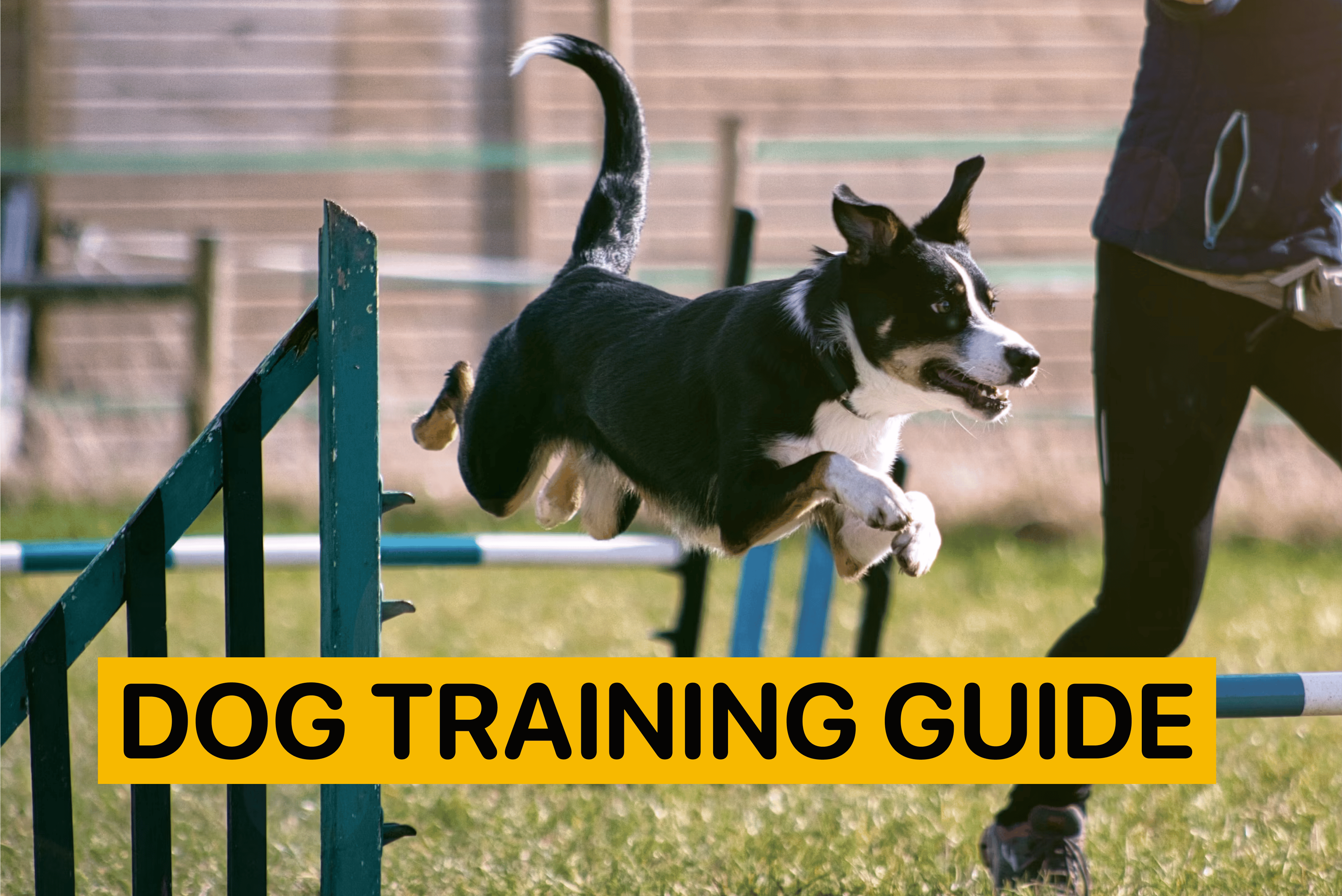How to Teach Your Dog to Catch a Frisbee Like a Pro

By
Tetiana Zhudyk Updated on |Reviewed by Frederica Caneiro
How to Teach Your Dog to Catch a Frisbee in 3 Working Ways
Playing frisbee is one of the most beloved activities a dog and its owner can enjoy. It incorporates numerous movements: running, jumping, twisting, and diving. As a result, it’s an excellent way for a human and a dog to get active, not to mention the pure joy and excitement the game brings.
Do you want to introduce your dog to catching frisbee? This piece will provide all the information needed to make the training effective and safe. Let’s dissect the most effective methods of teaching dog frisbee training and other tips and tricks of the process.
Before You Start the Training
Training a dog to catch frisbee is easier when you train certain breeds of dogs. However, others may need more help understanding the idea of the game. Regardless of your dog’s attitude to catching a disc, thorough preparation increases your chances of success.
Here is what you need for a frisbee training session with your dog:
-
A Frisbee: Choose a disc of a suitable size for your dog. Also, the safety of the material used must be considered.
-
Tasty treats: Some disc dog training methods include offering delicious rewards. Stock up on the treats your dog enjoys to bribe them into the game.
-
A proper training spot: Wide open spaces work best for playing frisbee with a dog. Find a place where your dog can run free while staying safe.
Pro tip: Avoid paying frisbee with dogs with serious health issues, including limited mobility. Other limitations include injuries and senior age. Remember, the game is physically challenging, so practice it only when the dog is healthy.
How to Teach a Dog to Catch Frisbee in Air
Method 1: Make the Dog Excited
This method relies on the power of shared excitement that dogs and humans can have while playing frisbee.

Here is how to train a dog to catch a frisbee using excitement:
-
Establish eye contact with your dog. Get excited about the upcoming activity. Act enthusiastically, speak cheerfully, or clap your hand to show the dog that a fun game is coming.
-
Bring a frisbee disc close to the dog’s nose to let them sniff it. If the dog gets scared of new things, don't put it close to their nose. Invite the dog to get close to the frisbee instead. You can say, "What's this?" in an enthusiastic tone of voice and move backward to encourage your dog to approach it. Praise the dog for showing interest in the disc.
-
Throw the disc gently at a short distance. Encourage your dog to fetch the disc and call the dog back when they pick up a frisbee in the mouth.
-
Keep practicing to help your dog get the idea of the game. You may gradually increase the distance you toss a disc each time you play.
Method 2: Build the Strategy
This method requires your dog to know or learn specific commands. In addition, more thorough planning should be done on your behalf. However, some dog owners find it compelling.

Here is how to teach your dog to catch a frisbee using a strategic method:
-
Introduce your dog to a frisbee and show excitement. Your dog should know how to release objects on your command at this stage. If needed, practice the drop-it cue.
-
Take the disc and flip it on the side. Encourage your dog to pick up the disc from the ground.
-
Make your dog run around you before you throw the frisbee away. This part is helpful for speedy dogs who get excited too quickly.
-
Make sure your dog knows the take-it command. Allow your dog to grab the frisbee from your hands and start slightly tossing the disc each time you play.
-
Finally, increase the distance. Say, “Catch it!” and throw the disc far away. Your dog will chase it to bring it back to you.
Method 3: Bribe the Dog
This method is beneficial for dogs who show no interest in or are scared of the Frisbee disc. It implies using positive reinforcement and slow dog introduction to the activity.

Here is how do you train a dog to catch a flying disc with a bribe:
-
Put treats in the disc to make your dog associate it with positive emotions. When the dog approaches the disc, throw them a treat.
-
You can play other games, making the disc an everyday object for your dog. Tug-of-war is an excellent example of a game for which you can use the disc.
-
Tell your dog to let go of the disc and reward following the command.
-
Throw the disc gently and praise/reward the dog for returning it.
-
Increase the distance and gradually eliminate the rewards. Keep practicing to reach the best results.
How to Keep a Dog Safe When Catching Frisbee
Though throwing frisbee for your dog to catch is a great way to spend time together with your furry friend, there are some risks a dog owner should consider. The game is physically demanding, so keeping the dog safe during the process is essential.
Here is how you can help your dog avoid injuries while jumping for a frisbee:
-
Warm up your dog before starting. Frisbee is a high-impact activity, so ensure your dog is ready to play. Using multiple muscle groups simultaneously is required.
-
Throw the frisbee properly. Toss a disc lower line to prevent the dog from leaping up and landing hard.
-
Do stretches at the end. Just like you start the training session with a nice warm-up, finish it with some stretches. This will help prevent muscle tightness and relax your dog after the workout.
Important to know: Avoid playing this game with puppies, especially with large breed dogs who have a greater risk of injuring themselves during the development stage
Training a dog to play frisbee provides owners with quality time together. Some dogs are easy to teach the game, while others may be uninterested in approaching a disc. Remember to keep your dog safe during the training process. Use one of the three methods described above to help your dog master the frisbee game fast and effectively.
Read more:
Top Fun Activities for Enrichment and Bonding with Your Dog
Beyond Fetch: Creative Ways to Provide Mental Stimulation for Dogs
